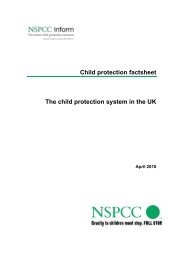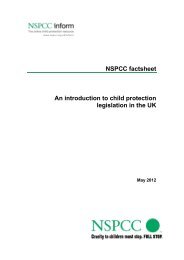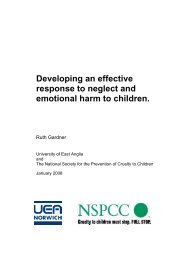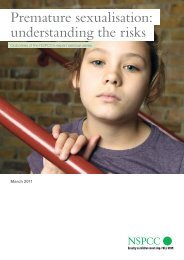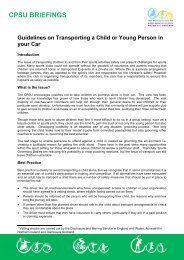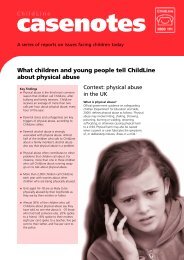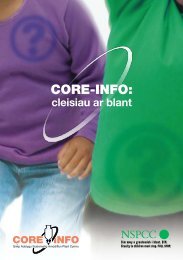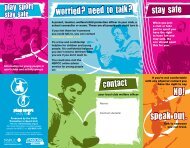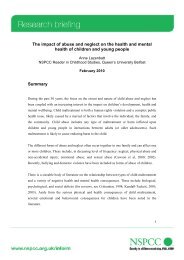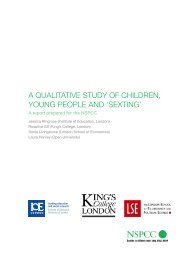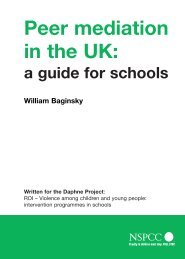Neglect and serious case reviews (PDF, 735KB) - nspcc
Neglect and serious case reviews (PDF, 735KB) - nspcc
Neglect and serious case reviews (PDF, 735KB) - nspcc
You also want an ePaper? Increase the reach of your titles
YUMPU automatically turns print PDFs into web optimized ePapers that Google loves.
maiNtaiNiNg a healthy, Safe relatioNShip<br />
4. Implications for policy <strong>and</strong> practice<br />
Crittenden has written extensively about the importance of maintaining a safe, healthy<br />
relationship for a child <strong>and</strong> ways that parents can be helped to comfort <strong>and</strong> protect<br />
their children from external danger rather than being a source of that danger themselves<br />
(Crittenden 2008). There were numerous examples in this study where parents were<br />
wittingly <strong>and</strong> unwittingly a source of danger to their child. We have shown that when<br />
signs of neglect are evident, practitioners can be blinkered to the physical danger that a<br />
parent or carer poses to a child. Similarly we have shown that a child’s life can be at risk<br />
when the relationship between the child <strong>and</strong> caregiver is so poor that care, nurture <strong>and</strong><br />
supervision are almost non-existent.<br />
Situations this severe usually evolve over time but they can also develop rapidly with<br />
the onset of severe parental mental illness or the arrival of a dangerous but unknown<br />
adult in the household, or with an intolerable accumulation of stress. While every effort<br />
should be made to intervene early to prevent a parent–child relationship deteriorating in<br />
this way, once this happens urgent action needs to be taken. Action is stalled when this<br />
danger is hidden, when children <strong>and</strong> families disappear from view, when appointments<br />
are missed <strong>and</strong> potentially, when children do not get the ordinary oversight offered by<br />
attendance at school or nursery.<br />
Parent–child relationships are often highly complex <strong>and</strong> practitioners need to be sensitively<br />
attuned to this relationship, even where parents present as loving but may be<br />
failing to cope, for example with the dem<strong>and</strong>s of their child’s complex health needs or<br />
disability. <strong>Neglect</strong> of medical care can become fatal or cause life-long damage.<br />
Underst<strong>and</strong>ing how an adolescent with a history of neglect feels <strong>and</strong> behaves is also<br />
complex. Older children carry the legacy of their experiences of neglect <strong>and</strong> rejection<br />
with them <strong>and</strong> need sensitive practitioners to underst<strong>and</strong> that the impact of their experiences<br />
can be life threatening as a result of their own high-risk behaviour or from<br />
suicide. Like younger children, adolescents need to maintain safe healthy relationships<br />
with their peers <strong>and</strong> with caring adults.<br />
The Munro Review has reminded us that practitioners need to be supported by a system<br />
that allows them to make good relationships with children <strong>and</strong> parents <strong>and</strong> supports<br />
them in managing the risks of harm that stem from maltreatment. This includes the harm<br />
from neglect <strong>and</strong> the way that neglect can conceal other risks <strong>and</strong> danger.<br />
messages for decision makers, policy makers, practitioners <strong>and</strong> managers<br />
• Use routine contact between parents <strong>and</strong> professionals as an opportunity to promote<br />
sensitive <strong>and</strong> attuned parenting (Hibbard et al 2012). Where there are early concerns,<br />
targeted help should be offered by services like Children’s Centres or enhanced health<br />
visiting services like Nurse Family Partnerships. Older children should have ready<br />
access to school- or community-based help or services from CAMHS.<br />
81




